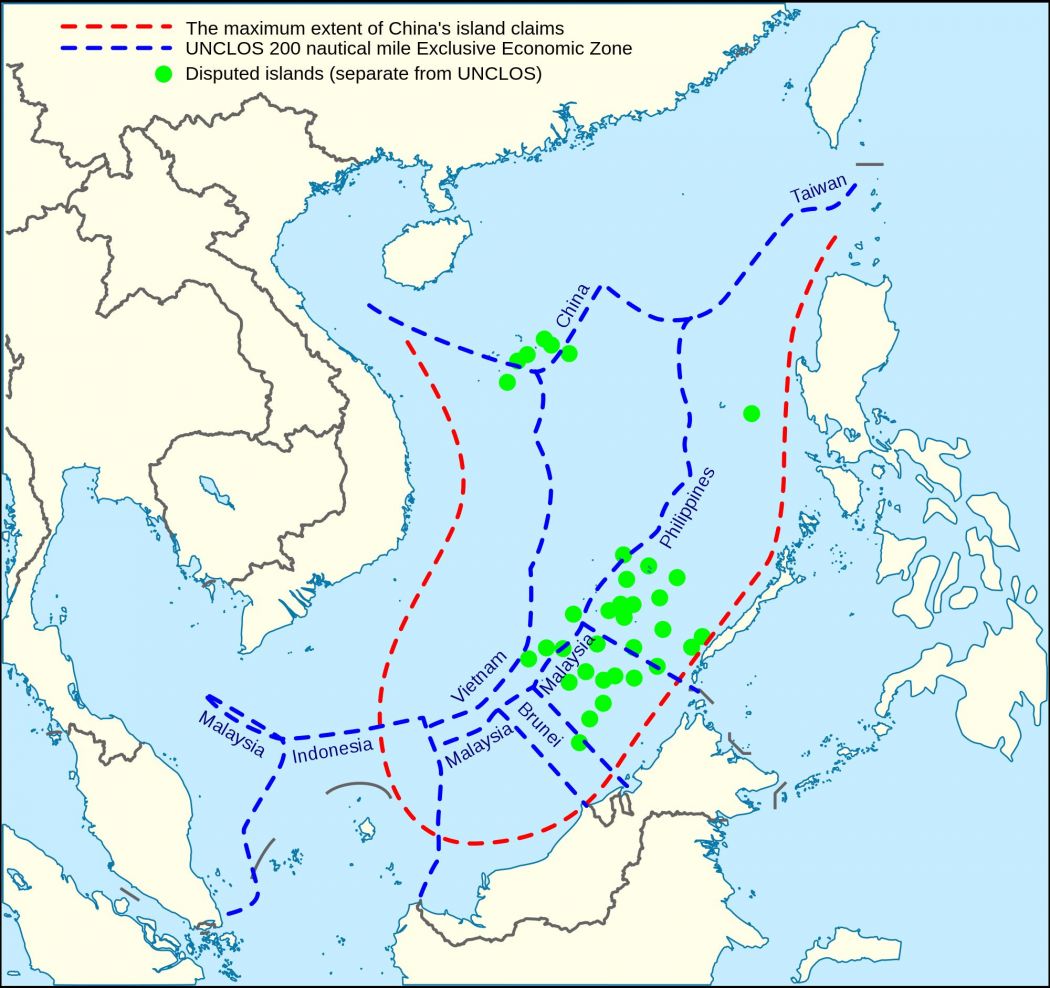By Ramon Collado
China’s appetite for expansion in the South China Sea continues to grow at an alarming rate. The South China Sea, where US$5.3 trillion of trade traverses each year, allegedly possesses 11 billion barrels of oil and 190 million cubic feet of natural gas.
China, paradoxically a member signatory of the United Nations Convention on the Law of the Sea (UNCLOS), has built military installations in Woody Island, airstrips in the Spratly Islands, and several ports along the South China Sea.
Additionally, Beijing has deployed fighter jets, cruise missiles, and radar systems along the “nine dash line”: a maritime line utilized by China to encircle its alleged waters in the Sea.

China’s land grabs in the South China Sea are threatening sea lines of communication, which are critical maritime passages for trade and movement of naval forces. To safeguard its political, security, and economic interests in the Sea, the United States (US) has conducted freedom of navigation operations and has boosted its support for Southeast Asian partners, such as Malaysia, Vietnam, Brunei, Taiwan, Indonesia, and the Philippines.
Beijing, in its pursuance of global supremacy, maintains that, under international law, foreign militaries must not conduct intelligence gathering activities, such as reconnaissance flights, in its exclusive economic zone (EEZ); Washington claims that countries should have freedom of navigation through EEZs in the sea and are not required to notify claimants of military operations.
China’s territorial disputes have harmed relations between China and U.S. partners in Southeast Asia, risking a military conflict. Washington’
Further, a dispute between China and Vietnam over territorial claims could threaten the military and commercial interests of the United States and could spark a regional conflict.

Due to the high probability of regional conflicts in Southeast Asia, China, the most populous nation in the world (1.4 billion people), is skyrocketing its defense budget from US$123 billi
China’s appetite for global supremacy is affecting the national security of the United States. Since 2010, Beijing has dismantled U.S. government intelligence operations on Chinese soil, killing or imprisoning at least 18 U.S. government sources.
Further, it is believed that Beijing’s intelligence networks in the U.S. include up to 25,000 Chinese intelligence officers and more than 15,000 recruited agents. In 2012, China’s Ministry of State Security (MSS) recruited an American of non-Asian descent in a bid to infiltrate the U.S. Intelligence Community; this unconventional recruiting maneuver baffled the U.S. intelligence apparatus.
In 2016, FBI employee Kun Shan Chum pleaded guilty to passing sensitive information to China in exchange for money, female escorts, and luxurious hotels. Additionally, the Shanghai State Security Bureau (SSSB) has appeared in several U.S. infiltration cases, and it is one of the most active MSS arms targeting the U.S.
The SSSB feeds off a recruiting pool that includes foreign intellectuals from some of the best universities in China, including Fudan and Shanghai Jiao Tong.
Essentially, China’s growing appetite for expansion and artful military and intelligence operations endanger U.S. influence and interests; China’s aggressive behavior and ironclad governmental apparatus are making it a more powerful and complex nation.
The U.S. must not back down to China’s aggressive modus operandi. Washington must continue to flex muscle in the South China Sea and must strengthen multilateral and bilateral cooperation with Hanoi, Manila, Bandar Seri Begawan, Kuala Lumpur, and Jakarta. Washington-Taipei cooperation must also remain solid.

A robust U.S. presence in the South China Sea is paramount to contain China’s aggressive behaviour. Given China’s airtight governmental core, the U.S. must seek support from its allies in the Far East–e.g. Japan, South Korea–to establish a constant, concise flow of sensitive information with respect to China’s military and intelligence activities on and off Chinese soil.
Briefly, joint war games, intergovernmental cooperation, and strong diplomatic and commercial relations between the U.S. and its Southeast Asian partners are key to check the voracious appetite for expansion and global supremacy of the world’s most complex hegemon, the People’s Republic of China.
Ramon Collado is a writer with a graduate degree from New York University’s Center for Global Affairs. Follow him on Twitter.
